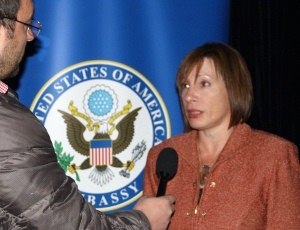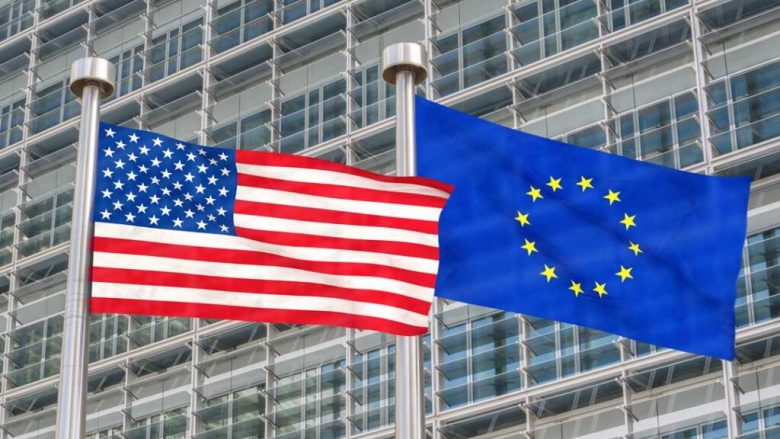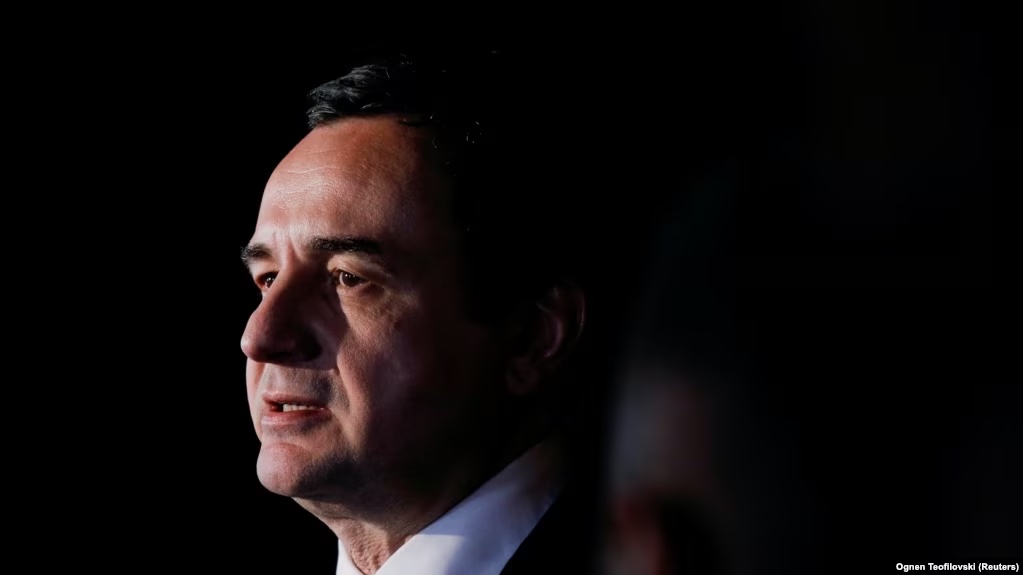Wednesday, May 14th 2014

Tracy Ann Jacobson
Radio Free Europe: Thank you, Madam Ambassador. Why it is necessary for Kosovo to create the court focused on the war crimes?
Ambassador Jacobson: Let me say that my government has invested more than three years, together with the European Union, in a fully transparent and proper investigation of the allegations, which were raised in Senator Marty’s report to the Council of Europe back in 2010. During this time, we primarily focused on letting the Special Investigative Task Force pursue its investigation, which I understand is done, with the cooperation of governments throughout the region. But now we’re to that point when that investigation is coming to an end. I expect that sometime in June, the Special Prosecutor, Ambassador Clint Williamson, our former ambassador-at-large for war crimes, at that point – I don’t know exactly what he’ll do, but they will be providing some information about the results of that investigation by June. And it’s very important that before that time, Kosovo sends a signal that it’s prepared to stand up to deal with these charges, which have been a black cloud over Kosovo for some number of years, in a way that is fully transparent and has international credibility. What this is really about is Kosovo’s credibility. And by establishing a special court, a special Kosovo court, to be staffed by international judges, with a seat in Kosovo, but also with a seat outside of Kosovo, where sensitive matters, such as interviews with witnesses can be dealt with, that would mean that Kosovo was stepping up to its international responsibilities and building its international credibility. I think it’s a challenging task. Right now everything that requires two-thirds of the Parliament to vote in favor of is a challenge, but this is I think one of the most important things – certainly during my time here – that we’ve ever asked Kosovo to do.
Radio Free Europe: Are you seeing those signals, the positive ones? And what if it fails to adopt it through the Parliament?
Ambassador Jacobson: Well, I believe people are starting to understand that in reality if this doesn’t succeed, the options are far worse. If we have a court, a Kosovo court, an international court with two seats, that’s requested by Kosovo, that’s approved by Parliament with a two-thirds majority of vote – that sends one signal. That sends a signal that the European Union, the United States, we can all say that the Government of Kosovo is engaging in a transparent, internationally credible process. If Kosovo is not able to move forward with this idea, what will likely happen is that the issue will be taken up by some international body, such as the United Nations. You know every time we have these quarterly meetings in New York, where Prime Minister Dacic and Prime Minister Thaçi talk about all the progress with the dialogue, there is one member of the Security Council, Russia, which always takes the opportunity to criticize Kosovo based on these allegations. And we think that it would much better for Kosovo to have a court, which it has some influence over, which it has requested, which is international in terms of its staffing than to have a process, for example in the United Nations, which might be larger in scope, might not be limited to the allegations in the Marty report, but it could be much broader and which would be something totally disconnected from Kosovo. We think that would be potentially very damaging for Kosovo’s credibility and it would give a tool to those who want to question the legitimacy of Kosovo’s independence.
Radio Free Europe: But some even argue that the court itself questions Kosovo’s independence and integrity if we compare it and they take as an example comparing to other countries in the region that did not have such a court?
Ambassador Jacobson: I want to point out that this court, this proposal for the court, is not in any way an indication about the lack of responsibility or the lack of progress here in Kosovo. On the contrary. I think the proposal on the table for an exchange of letters between Kosovo and the European Union includes two elements. It includes the setting up of the Special Court to handle the investigations from the Special Investigative Task Force and it also includes a change in the mandate of EULEX to recognize the progress that Kosovo has made, to show that Kosovo will have more of the executive authorities, for example the leadership of the SPRK; that EULEX won’t normally take on any new cases unless the Government of Kosovo asks for that. They’ll finish the work that they’re doing now. I think this really shows the maturity of Kosovo’s justice system.
I also want to point out that I’ve heard in the media this idea portrayed as a tribunal for the KLA, which is absolutely false. It’s a court to potentially try accusations against individuals. It’s not a commentary on the war in 1999; it’s not a commentary on any group. It really is specifically limited in scope to those allegations brought up in the Marty report. We see it for Kosovo as the best opportunity for Kosovo to set the record straight and move forward with other important issues in the future without the sort of stain in this report lingering any longer than it has to.
Radio Free Europe: Well, you’re saying that Kosovo’s authorities aren’t to be blamed, if I’m getting it right. But on the other hand, we have the EU mission, which is a EU Rule of Law-led mission to Kosovo. Who to blame then?
Ambassador Jacobson: It’s not my job to assign blame to anybody. I would note that our main focus has been on allowing the investigation to proceed. Kosovo has done a lot of hard work, made a lot of progress in the time I’ve been here, certainly, but in recent days, we’ve had to face the fact that June is coming before we know it; the end of the investigative period is coming and now we have to deal with mechanisms to move forward and the Government of Kosovo has worked very hard with the European Union to try and find the best possible solution. We support this solution that’s on the table now; we see it as the only way forward for Kosovo.
Radio Free Europe: Who should the court be held accountable to? Who should it give account to and why should its headquarters be in Pristina and somewhere else? What should its mandate and its tasks be? Is it going to look like Dick Marty’s report or like Dick Marty’s court or tribunal?
Ambassador Jacobson: Well, this will be a court staffed by internationals. It will be a court established at the request of the Government of Kosovo. As to where the external seat is, I don’t know that at the moment… there are various discussions going on and that will have to be the subject of a bilateral agreement between Kosovo and the country that agrees to host the outside seat of the court. And as I understand it, the scope of the court – if this court goes forward – is limited to those allegations that are contained for that period of time in the Marty Report.
Radio Free Europe: You are saying that Kosovo should ask a third country to adopt it and Kosovo should move forward. Is there a timeline when it should do all this homework?
Ambassador Jacobson: It is a process and I think it is a process that takes place in a few phases. I think the first phase really needs to be done by this existing Parliament now before it dissolves. We hear constant rumors about when the Parliament may vote to dissolve itself to move forward to elections. So the exchange of letters is key to establishing that level of understanding between Kosovo and the European Union in advance of the June end of the investigative period. Later on, a new parliament is going to have to take issues of legislation, issues of an agreement with the country that will host the outside seat of the court. That will probably have to wait until the next parliament, but we need a good exchange of letters now to set the legal basis and the understanding for moving forward.
Radio Free Europe: Once Ambassador Clint Williamson finishes its report, as you said he’s about to finish it and maybe he did it already, whom should he hand that report and that investigation to? Really, is it going to be this court that will handle it? Who’s going to be the first nation to see it?
Ambassador Jacobson: It will be this court which will handle the investigations to the extent that they’re completed if two-thirds of the Assembly can vote in favor of this proposal.
Radio Free Europe: So, the report won’t be published before the court is established?
Ambassador Jacobson: I don’t know what Ambassador Williamson intends to do specifically to do in June. He’s leading an independent judicial process and whether he’ll have a press conference or – I just don’t know at this time. He’ll let us know when he’s ready.
Radio Free Europe: What if Kosovo fails to adopt it or to pass in the Parliament such a court?
Ambassador Jacobson: Well, in that case I imagine there will be calls for a UN-led process and the United States, although we’re very good friends with Kosovo and we support Kosovo’s development, we would not be in a position to veto such a call.
Radio Free Europe: Do Kosovo leaders know this?
Ambassador Jacobson: Yes, they do. We’ve made it very clear, especially last week. We had the first in-depth conversations with the political leaders on this. I hosted them. We had meetings with them together with Jonathan Moore, my colleague in Washington. We had another meeting on Monday morning with political leaders and the Quint ambassadors and the EUSR. I think that our position is very clear.
Radio Free Europe: If you don’t mind, I would like to ask you about your thoughts on the war on Syria. Some fear that by having Kosovars fighting in Syria, after returning in Kosovo there might be a cause of worry. Is that so?
Ambassador Jacobson: I think that is absolutely something that we all need to worry about. It’ a terrible thing the war in Syria. It’s been going on for a long time. But, we’re also worried here in Kosovo about young Kosovars going to fight in Syria, aligning themselves with radical groups and developing that kind of ideology and then, what happens afterwards? We saw the attack on the three gendarmerie in Turkey, who were killed by a returning fighter. There was a suicide bombing in Iraq carried out by a Kosovar, who had been in Syria. So, yes, it is very concerning and I think we need to respond to this as an international community together with Kosovo, because it’s not just a problem in Kosovo obviously, it’s a worldwide problem.
And I think there are a variety of different responses that we need to work on together. One of them is the law enforcement response. Kosovo’s proposed law on fighting in Syria is a good first step. We’ve got to coordinate in terms of sharing information on who these people are, where they are, what their intentions are. But, I think there’s also a larger societal conversation that needs to take place. People are attracted to these radical ideologies sometimes because they don’t see that they have other opportunities, economic opportunities, or opportunities to participate in a robust way in a conversation the country is having about its future. So,this gets to the issue of economic development, democratic development, social development and education. I think that we can all work together to create those kind of conditions in Kosovo that are less conducive to that kind of attraction to any form of radicalism, be it Islam or any other kind of radicalism that exists.
Radio Free Europe: You say that we should be worried. What does it mean? That they are returning as terrorists. Can we put it that way?
Ambassador Jacobson: Well, I think we’ve seen two that are alleged to have committed terrorist acts. So, that is a clear symbol. And this is also the case in other countries in Europe. I would say that in most of my conversations with Kosovars, Kosovars are very proud of the fact that they’ve had a form of tolerant, respectful Islam here that respects diversity; where people live together; where nobody tries to impose their views on somebody else. And I speak to a lot of Kosovars who are concerned about the emergence of a more extreme form of Islam. Most Kosovars don’t want to see that. They want to see development of a multicultural, multi-ethnic, multi-religious society that’s based on mutual respect. That’s what I hear from the people of Kosovo. That’s what I hear from the Government and certainly we support that.
Radio Free Europe: What about the Islamic Community of Kosovo? Is it doing its job properly? Because many argue that they aren’t because apparently everything starts from the imams, who are preaching at the mosques. I may be mistaken, but that’s what we hear.
Ambassador Jacobson: I have heard that; we’ve read that in the media. It’s not my job as the American ambassador to pass judgment on any institution, including the Islamic Community. But I have heard some of the speeches by some of the imams, which are quite concerning, including some speeches that are quite misogynistic. That’s not something that has any place in a 21st century democracy. So, I think this is an issue where Kosovars themselves need to make their voices heard. It’s not as important what the American Ambassador thinks. It’s what Kosovars think. It’s what kind of society they want to have; what kind of religion they want to have, and what kind of relationship between the religion and the secular state they want to have. And I think Kosovars themselves could be more outspoken on these issues.
Radio Free Europe: So, you think that they are not? Or you’re not saying that.
Ambassador Jacobson: I think that I’ve heard a lot of people bring concerns to me and to the American Embassy and to other internationals that they haven’t voiced in the same sort of way in broader society.
Radio Free Europe: Do you think that Kosovo might lose its most cherished value that it had an interreligious peace and tolerance that they’ve had for such a long period of years.
Ambassador Jacobson: Well, I hope that the vast majority of people in Kosovo who do support the secular state, who support religious diversity, who support mutual respect, will have their voices heard and those will be the voices that chart the course forward in the future.
Radio Free Europe: How do the U.S. government and Kosovo government cooperate on the issue?
Ambassador Jacobson: We have a lot of different forms of cooperation. You know, in terms of law enforcement, we have a very broad program of law enforcement cooperation, which includes the Department of Justice, ICITAP, we work with the police, but we also have here the Department of Treasury, which is working on economic crimes and being able to trace financial flows. We’ve provided a lot of training to investigators, prosecutors and judges in this area, as well. In broader areas, I mentioned economic development, education, good governance, we have broad programming in all of these areas, including some new programs that are coming online this year to send more people to the U.S. for education, for example; to have more outreach with minority communities; to have a focus on government at local and central levels, which is inclusive. So, we will continue to cooperate through all these mechanisms.
Radio Free Europe: Do you think that Kosovo has the capacity to combat terrorism?
Ambassador Jacobson: I think its capacity is growing every day. I don’t think any country in the world all by itself has the capacity to combat international terrorism. This is an area where every country needs to develop its own internal capacities and its links with the regional and international partners, because it is a worldwide effort.
Radio Free Europe: Thank you.
Ambassador Jacobson: It was my pleasure.




